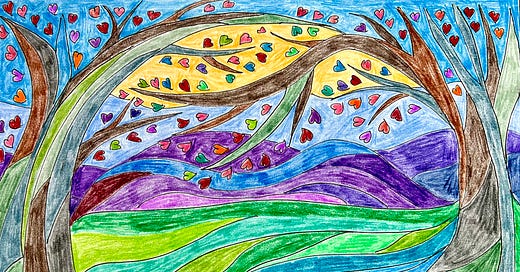Writing the Future: Thrutopian Style
Thrutopia: an antidote for the despair and apathy spawned by our individual and collective dystopian thinking.
In about a week I’ll be launching a new course at my college, “Writing the Future.”
It was supposed to be a full-semester online course with students from around the world via the Bard Open Society University Network, but I did not get enough enrollment at the start of the semester, so I modified it to a half-semester in-person course. Now I have enough students to run, but still hardly a robust showing.
Why the lack of interest? Are students afraid to think about the future? Is it uninteresting to them?
The full course title is “Writing the Future: Creating Thrutopian Narratives for a Just, Stable, Healthy World.” Did the upbeat subtitle make them think we’d be looking at the future through rose-colored glasses, an activity they deemed not worth their time?
Who knows? Over my many years of teaching I’ve found students to be fickle in their interests and impossible to predict. So I just stick to my interests and hope to attract the kindred spirits who are excited to come along with me to explore the terrain.
For years now I’ve been reading and watching the way our culture has represented the future, in fiction and nonfiction, and feeling uneasy about all the negative and frightening projections we collectively produce and consume.
Telling us over and over that “we’re all going to die!” and depicting the thousand depressing ways it will happen is just a recipe for despair and apathy.
There have been a few environmentalists who have recognized that “we won’t save what we don’t love,” and that therefore the key is to cultivate people’s love for and connection to the natural world, in order to bring out their protective warrior spirit.
But the dominant narrative continues to hit us over the head repeatedly with the double whammy of fictional disaster scenarios that grimly show what will happen if our society doesn’t change its ways, and agitated news reporting that tells us just how far we are from meeting any of the necessary targets for positive change.
I’ve been searching for some so-called “cli-fi,” climate fiction, that presents a positive vision we could aspire to. If you know of any, please share! Ernest Callenbach’s Ecotopia is quite dated, and Starhawk’s Fifth Sacred Thing is terribly long and awfully violent on its way to a moderately happy ending. Most cli-fi sits squarely within the genre of dystopia.
But maybe the tide is turning. I was delighted, about a year ago, to discover Manda Scott’s online courseand writing community, based on Rupert Read’s concept of a “thrutopia”—a fictional scenario that imagines a way through all the current crises to a better world.
Thrutopia is different from utopia because the focus is not just on imagining the positive outcome, but also on researching and imagining the specific steps necessary to get us from here to there.
Manda’s online course, like her podcast Accidental Gods, provides a platform for a wide range of thought leaders in different fields to share their ideas on how to thread the needle of our contemporary interlocking social and environmental crises.
Out of the first iteration of the course has grown a “Thrutopia Council,” dedicated to continuing to activate and disseminate positive visions of the future; as well as a Thrutopia Writers’ Group that meets regularly to share writing drafts and explore practical questions like whether Thrutopian fiction should find alternatives to the conventional hero’s journey, or whether it’s imperative that a novel include conflict.
I will be keeping you posted as I roll out my Writing the Future class over the next few weeks.
At present I’m finding it hard to finalize my reading list, particularly since the ideas that form the matrix of this work are so complex, interwoven and emergent—where to start? How to trace a linear progression, in just a few weeks, through intricate concepts like Deep Adaptation, Active Hope, the Great Turning, Deep Transformation, Deep Time and the New Story, Thrutopia and Protopia, Deep Green Resistance, Extinction Rebellion and the Moderate Flank, Eco-anxiety, Warriors for the Human Spirit, Theory U, and on and on?
I want to bring students up to speed on these important movements and influencers, while making sure that they understand the gravity of our current historical moment. The focus of the course, however, is on the future: activating these young people’s imaginations and giving them a wide open field to dream big and bold.
As a final project, I’m imagining the class co-creating an online magazine or anthology of fiction and non-fiction, each person contributing their research of what is and their vision of how we could use our human ingenuity to resolve the issues and move into a better future.
Maybe some of the students will want to send a story to the Grist Imagine 2022 contest, now in its third year, a wonderful seedbed of Thrutopian creative thinking.
I see “Writing the Future” as completing the contemplative arc that starts with purposeful memoir, as I described it in my latest book, Purposeful Memoir as a Quest for a Thriving Future. First we look back over our individual experiences and collective histories to understand how we got here. Then, standing firm in a fuller understanding of the past and present, we look into the future and begin to move with intention towards the better world that could be.
This kind of creative, imaginative thinking cannot be done by an AI chatbot!
When we humans dream, the entire universe bends towards us in response, seeking to make those dreams a reality.
May we dream up a joyful future together, and then make it so.
Dreaming the Future. Drawing by J. Browdy





Isn't the positive climate fiction what Solar Punk aspires to be?